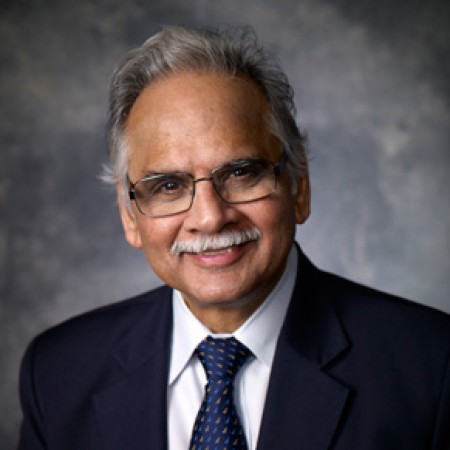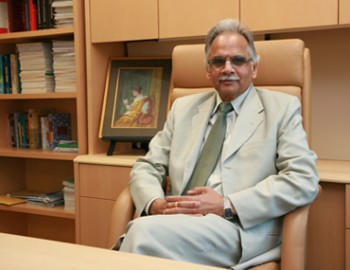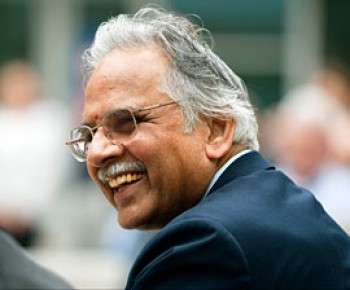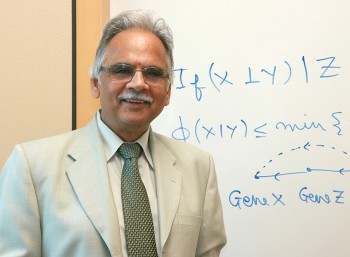Ph.D. - Electrical Engineering
University of Wisconsin - 1969

Mathukumalli Vidyasagar
Professor - System Engineering
Head, Bioengineering
Professional Preparation
M.S. - Electrical Engineering
University of Wisconsin - 1967
University of Wisconsin - 1967
B.S. - Electrical Engineering
University of Wisconsin - 1965
University of Wisconsin - 1965
Research Areas
Current Research Interests
My research interests are in the broad area of system and control theory, and its applications. At the moment I am working on problems in stochastic realization, specifically approximating high-order Markov and hidden Markov processes by lower-order processes, and the large deviation properties of such processes. On the applications front, I am interested in applying these (or any other appropriate) ideas to problems in computational biology and quantitative finance.Publications
M. Eren Ahsen and M. Vidyasagar, "Mixing coefficients between discrete and real random variables: Computation and properties", to appear in IEEE Transactions on Automatic Control. Preprint at arXiv, 1208:1720. forthcoming - Publication
M. Vidyasagar and Yutaka Yamamoto, "Convergence and compactness of families of proper plants in the graph topology", IEEE Conference on Decision and Control, Maui, Hawaii, December 2012, PDF 2012 - Publication
M. Vidyasagar, ``A metric between probability distributions on sets of distinct cardinalities and applications to order reduction,'' IEEE Transactions on Automatic Control, 54(10), 2464-2477, October 2012. PDF 2012 - Publication
M. Eren Ahsen, Nitin K. Singh, Todd Boren, M. Vidyasagar and Michael A. White, "A new feature selection algorithm for two-class classification problems and their application to endometrial cancer", IEEE Conference on Decision and Control, Maui, Hawaii, December 2012, PDF 2012 - Publication
M. Vidyasagar, Control System Synthesis: A Factorization Approach, Morgan & Claypool, 2011. (Completely re-typeset version, with several typos corrected, of Book No. 4 above) 2011 - Publication
M. Vidyasagar, ``The complete realization problem for hidden Markov models: A survey and some new results,'' Mathematics of Control, Signals and Systems, 23(1), 1-65, 2011. PDF 2011 - Publication
M. Vidyasagar, ``Probabilistic methods in cancer biology,'' European Journal of Control, 17(5-6), 483-511, September-December 2011. PDF 2011 - Publication
M. Vidyasagar, (Hidden) "Markov Processes: Theory and Applications to Biology",to be published by Princeton University Press. 2009 - Publication
Appointments
Cecil & Ida Green Professor of Systems Biology Science
UT Dallas [2009–Present]
UT Dallas [2009–Present]
Executive Vice President
Tata Consultancy Services, Hyderabad, India [2000–2009]
Tata Consultancy Services, Hyderabad, India [2000–2009]
Director
Centre for Artifi cial Intelligence & Robotics, Bangalore, India [1989–2000]
Centre for Artifi cial Intelligence & Robotics, Bangalore, India [1989–2000]
Professor
University of Waterloo, Waterloo, Canada [1980–1989]
University of Waterloo, Waterloo, Canada [1980–1989]
Professor
Concordia University, Montreal, Canada [1977–1980]
Concordia University, Montreal, Canada [1977–1980]
Associate Professor
Concordia University, Montreal, Canada [1973–1977]
Concordia University, Montreal, Canada [1973–1977]
Assistant Professor
Concordia University, Montreal, Canada [1970–1973]
Concordia University, Montreal, Canada [1970–1973]
Assistant Professor
Marquette University, Milwaukee [1969–1970]
Marquette University, Milwaukee [1969–1970]
Additional Information
Awards and Honors
- 2013 John Ragazzini Education Award, American Automatic Control Council, "For outstanding contributions to automatic control education through publication of textbooks and research monographs"
- 2012: Rufus Oldenburger Medal, American Society of Mechanical Engineering, "For his fundamental contributions to robust control theory, specifically L1-optimal control theory for linear control systems; nonlinear control theory, especially input-output stability theory; robotics, including the control of flexible beams; statistical learning theory and machine learning; and computational biology"
- 2012: Fellow, The Institute of Physics, United Kingdom.
- 2012: Fellow, The Royal Society, United Kingdom.
- 2011: Harry H. Nyquist Lecture Award, American Society of Mechanical Engineers.
- 2008: IEEE Control Systems Award, for "Promulgation of control science and engineering and contributions to robust control, robotics and statistical learning theory"
- 2005: Jawaharlal Nehru Centenary Lecture Prize, Indian National Science Academy
- 2004: Named as `One of Forty Tech Gurus' in the world by IEEE Spectrum
- 2002: Best Paper Prize (Methodology) from the International Federation of Automatic Control (IFAC)
- 2000: Hendrik W. Bode Lecture Prize, IEEE Control Systems Society
- 1997: Fellow, Third World Academy of Sciences
- 1997: Scientist of the Year, Defence Research and Development Organisation, Government of India
- 1995: Distinguished Service Citation, College of Engineering, University of Wisconsin
- 1994: Fellow, Indian National Academy of Science
- 1992: Fellow, Indian Academy of Sciences
- 1992: Fellow, Indian National Academy of Engineering
- 1987: Best Paper Award, Society of Instrumentation and Control Engineers, Japan
- 1984: Frederick Emmons Terman Award, American Society for Engineering Education
- 1983: Fellow, IEEE
- 1981: E. W. R. Steacie Memorial Prize, Natural Sciences and Engineering Research Council of
- 1976: Prix Georges Montefiore, Association of Belgian Electrical Engineers Canada
News Articles
Bioengineering Head to be Inducted as Fellow of Royal Society
 Dr. Mathukumalli Vidyasagar, an internationally known expert in control and system theory, has been elected a Fellow of The Royal Society, the oldest continuously operating scientific society in the world. Vidyasagar, head of theDepartment of Bioengineeringat The University of Texas at Dallas, joins the ranks of the most distinguished international scientists drawn from all areas of science, engineering and medicine. Vidyasagar’s selection recognizes his contributions to various aspects of control and system theory, robotics, statistical learning theory and computational biology. His citation reads: “He has combined probability theory, combinatorics, and artificial intelligence to produce a beautiful unified theory of statistical learning, and used it to solve NP-hard design problems.”
Dr. Mathukumalli Vidyasagar, an internationally known expert in control and system theory, has been elected a Fellow of The Royal Society, the oldest continuously operating scientific society in the world. Vidyasagar, head of theDepartment of Bioengineeringat The University of Texas at Dallas, joins the ranks of the most distinguished international scientists drawn from all areas of science, engineering and medicine. Vidyasagar’s selection recognizes his contributions to various aspects of control and system theory, robotics, statistical learning theory and computational biology. His citation reads: “He has combined probability theory, combinatorics, and artificial intelligence to produce a beautiful unified theory of statistical learning, and used it to solve NP-hard design problems.”
Mathematical Model May Improve Cancer Drugs
 A UT Dallas interdisciplinary researcher has launched a human genome analysis project intended to create a mathematical model that improves the efficacy of cancer drugs while reducing their manufacturing costs by as much as 30 percent. A three-year, $305,000 grant from the National Science Foundation will fund Dr. Mathukumalli “Sagar” Vidyasagar’s development of a new method for detecting DNA sequence similarities. “What I propose to do is to find mathematical models of how a cross section of cancer patients would react to a particular clinical trial drug,” he said. “If it is likely that an unacceptably high fraction would react adversely, that would allow the developers to kill that program in a timely manner.”
A UT Dallas interdisciplinary researcher has launched a human genome analysis project intended to create a mathematical model that improves the efficacy of cancer drugs while reducing their manufacturing costs by as much as 30 percent. A three-year, $305,000 grant from the National Science Foundation will fund Dr. Mathukumalli “Sagar” Vidyasagar’s development of a new method for detecting DNA sequence similarities. “What I propose to do is to find mathematical models of how a cross section of cancer patients would react to a particular clinical trial drug,” he said. “If it is likely that an unacceptably high fraction would react adversely, that would allow the developers to kill that program in a timely manner.”
Systems Engineering Professor to Explore Cancer Research in India
 Dr. Mathukumalli Vidyasagar, the Cecil H. and Ida Green Chair in Systems Biology Science, is an inaugural recipient of a fellowship designed to boost science research in India by providing opportunities for eminent overseas scientists to conduct research in the country.
Dr. Mathukumalli Vidyasagar, the Cecil H. and Ida Green Chair in Systems Biology Science, is an inaugural recipient of a fellowship designed to boost science research in India by providing opportunities for eminent overseas scientists to conduct research in the country.The Jawaharlal Nehru Science Fellowship, named after India’s first prime minister, is bestowed on accomplished scientists who are Fellows of the Royal Society or members of the U.S. or French national academies of science or their equivalents. The scientists will work part time in an Indian laboratory of their choice for a total of 12 months, spread over three years.
Systems Engineering Professor to Explore Cancer Research in India
 Dr. Mathukumalli Vidyasagar, the Cecil H. and Ida Green Chair in Systems Biology Science, is an inaugural recipient of a fellowship designed to boost science research in India by providing opportunities for eminent overseas scientists to conduct research in the country.
Dr. Mathukumalli Vidyasagar, the Cecil H. and Ida Green Chair in Systems Biology Science, is an inaugural recipient of a fellowship designed to boost science research in India by providing opportunities for eminent overseas scientists to conduct research in the country.The Jawaharlal Nehru Science Fellowship, named after India’s first prime minister, is bestowed on accomplished scientists who are Fellows of the Royal Society or members of the U.S. or French national academies of science or their equivalents. The scientists will work part time in an Indian laboratory of their choice for a total of 12 months, spread over three years.
Jonsson School Professor Receives Two Honors
Dr. Mathukumalli Vidyasagar, professor of systems engineering in the Erik Jonsson School of Engineering and Computer Science, has recently received two honors.The Department of Electrical and Computer Engineering at The University of Wisconsin, where Vidyasagar earned his bachelor’s, master’s and doctorate degrees, named him among their “125 People of Impact.” The Department, celebrating their 125th anniversary this fall, recognized those who are representative of the significant contributions their alumni and faculty have made.
Activities
Recent Synergistic Activities
- General Chairman, IEEE Multi-Systems Conference, Hyderabad, India, 2013.
- Member, National Organizing Committee, International Congress of Mathematicians, Hyderabad, India, August 2010.
- Joint organizer (along with Dr. Somdatta Sinha), Workshop on Applications of control theory and optimization in biochemical pathways, Hyderabad, India, August 2010.
- Member, Board of Governors, IEEE Control Systems Society, 2009.
- Chairman, National Subcommittee on Nanotechnology, Confederation of Indian Industry, 2009.
- Co-Guest Editor (along with Mustafa Khammash and Claire Tomlin), IEEE Transactions on Automatic Control/Circuits and Systems Special Issue on Systems Biology, January 2008.